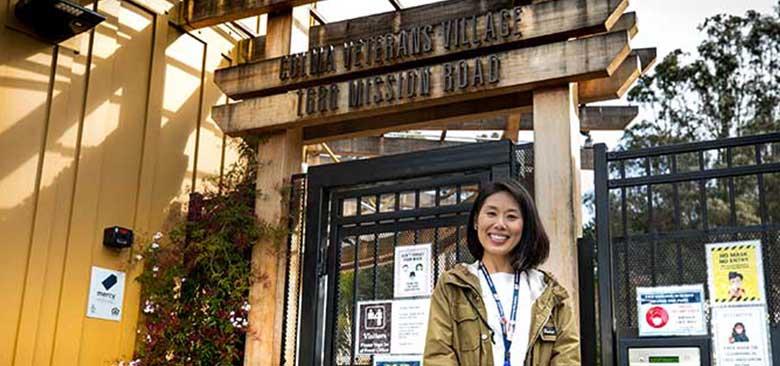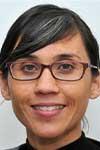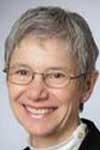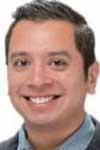
UCSF School of Nursing postdoctoral scholar Anna Oh is evaluating a new program designed to help aging veterans who were formerly homeless. (Photo credit: Elisabeth Fall)
UCSF Nursing Postdocs Are Advancing the Science of Health Care. Here's How.
Once a week, UCSF postdoctoral scholar Anna Oh visits the Colma Veterans Village, a housing center near San Francisco, where a new initiative has launched to help aging veterans who are formerly homeless.
The first-of-its-kind initiative combines permanent housing with care from an interdisciplinary team, including a nurse, geriatrician and social worker. These support services are critical because veterans are more susceptible to mental health issues such as suicide, post-traumatic stress disorder and depression, as well as physical issues, such as chronic pain, compared to the broader population. As they age, their conditions worsen.
Oh, a fellow in the Veterans Affairs Quality Scholars program, is evaluating how well the team is connecting veterans to important resources. She is also documenting the barriers veterans encounter, such as low incomes and veterans believing they don’t need assistance.
“The transition from homelessness to having a home can be tough,” Oh said. “They built a community on the streets and, sometimes within the four walls of a home, they can feel even more alone. Because of medical conditions, functional impairment and sometimes substance use, they need extra support.”
Oh is among the two dozen postdocs at the UCSF School of Nursing who are conducting research to advance health equity for vulnerable populations.
The postdoctoral experience at the UCSF School of Nursing offers a vibrant research environment where early-stage investigators are challenged to grow while supported by faculty mentors who are leading scholars in their fields. That support, coupled with UCSF’s institutional commitment to health equity and access to resources, creates opportunities for budding researchers to enhance their knowledge and skills.
A Place to Grow and Be Challenged
The School offers postdoctoral opportunities through four fellowship programs, established with funding from the National Institutes of Health or in partnership with such leading institutions as Veterans Affairs and the National Clinician Scholars Program. Postdoctoral studies can also be arranged by individual request with School faculty, depending on the subject area.
While many Americans shuttered their travel plans last spring due to the COVID-19 pandemic, José Gutierrez moved across the country without a second thought. He knew his research, focused on aiding at-risk military members and veterans, would be enhanced by a postdoctoral fellowship at the UCSF School of Nursing.
“I knew it would be a great place to not only continue to grow, but also be challenged by researchers,” said Gutierrez, who received his PhD in nursing from Yale University last year. “I feel like I need that to strengthen my research trajectory and career.”
Gutierrez accepted a two-year postdoctoral fellowship at the School as part of the National Clinician Scholars Program (NCSP), which prepares nurse leaders to be change agents in health equity. Although the pandemic has limited in-person contact, Gutierrez said the support and guidance he has received from the School’s scholars has helped him advance his work.
The ability to conduct research under faculty mentors who are experts in their field is also a major draw.
 Renee Mehra ACTIONS postdoc Renee Mehra came to UCSF for the opportunity to train under associate professor Monica McLemore. “It was important for me to be mentored by someone who is Black or a person of color,” said Mehra, who has learned from McLemore the importance of applying a reproductive justice framework, centering the most marginalized people, and utilizing a community-based, participatory research approach to conduct her research on health equity.
Renee Mehra ACTIONS postdoc Renee Mehra came to UCSF for the opportunity to train under associate professor Monica McLemore. “It was important for me to be mentored by someone who is Black or a person of color,” said Mehra, who has learned from McLemore the importance of applying a reproductive justice framework, centering the most marginalized people, and utilizing a community-based, participatory research approach to conduct her research on health equity.
And Oh, who is mentored by professor Meg Wallhagen, senior nurse scholar of the VA Quality Scholars Program at UCSF, said, “She has this critical lens in the most positive way  Meg Wallhagen possible. She challenges you in thinking bigger.”
Meg Wallhagen possible. She challenges you in thinking bigger.”
UCSF, and its partners, are committed to providing a research environment and culture that nurtures the growth and preparation of future scientists, Wallhagen said.
“There is really a lot of expertise across campus and the range of research opportunities here are tremendous,” Wallhagen said. “There is so much knowledge that’s passed around, and being able to gain quality mentorship in this research-intensive environment is special.”
Postdocs Propel Research Forward
The School’s distinctive environment is fostering innovative studies. From preventing HIV transmission among at-risk populations, to developing services and support for aging adults, to reducing racial and ethnic inequities in birth outcomes, the School’s postdoctoral scholars are addressing critical issues affecting vulnerable populations — an important facet of the School’s mission to promote equitable health outcomes for all.
 Gutierrez’s research focuses on structural and environmental barriers that restrict or deny active military members and veterans from accessing HIV preventative services such as pre-exposure prophylaxis (PrEP). That population is especially meaningful to Gutierrez, a veteran of the U.S. Air Force and current Air National Guard member.
Gutierrez’s research focuses on structural and environmental barriers that restrict or deny active military members and veterans from accessing HIV preventative services such as pre-exposure prophylaxis (PrEP). That population is especially meaningful to Gutierrez, a veteran of the U.S. Air Force and current Air National Guard member.
Taking a daily oral tablet is the most common form of HIV PrEP, said Gutierrez, but that can be burdensome for military members with hectic schedules, long deployments or who fear others discovering their medication.
Gutierrez’s PhD dissertation showed that active U.S. military members prefer longer-acting PrEP agents such as injections instead of daily tablets. An injection that can provide up to two months of protection against HIV is being developed and will likely soon move toward approval and real-world implementation. Gutierrez’s current study aims to determine how other military-experienced individuals, such as veterans, want to access these injections.
“I’m focused on determining the preferences most likely to maximize engagement,” said Gutierrez, who is mentored by School of Nursing professor Susan Chapman. “Do they want to use telehealth, a mobile van, a nurse-led clinic or a pharmacy-driven program as an alternative to the traditional prep injection at the office.”
Reducing Racial Disparities at the Start
While Oh and Gutierrez are searching for health care solutions for adults, other postdocs like Mehra are focused on eliminating health inequities at birth.
Mehra, mentored by professor Linda Franck, is evaluating policies and programs implemented by California counties that may address racial and ethnic inequities in birth outcomes. Using vital statistics data managed by the Family Health Outcomes Project, Mehra will examine spatial and temporal trends in adverse birth outcomes by race and ethnicity.
Mehra is also working on two other studies: One study, with the ACTIONS team and Commonsense Childbirth, is examining the motivators and barriers to pursuing midwifery education for people of color. The other project, with colleagues from UC Berkeley, explores payment models for community doulas.
“There are so many opportunities at UCSF to collaborate on a number of projects,” Mehra said. “That’s been very helpful to my professional development.”



